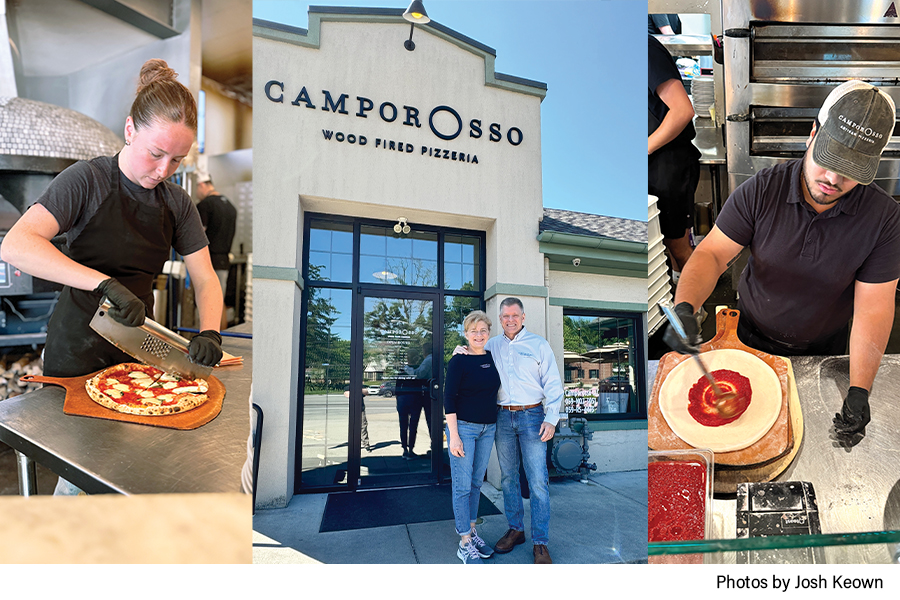After two turbulent years, some operators are ready get out of the business
After four years of hustling to build Pizza Head into one of St. Louis’ go-to pizza joints, Scott Sandler tired of the day-to-day grind.
Operations became increasingly complicated by COVID-era protocols, staffing issues and customers, while the pandemic had shaken Sandler’s original business model. Instead of being a chill dine-in space with tasty pies, cold beer and rock ‘n roll music – the precise formula Pizza Head rode to early success – the pandemic forced Sandler to prioritize off-premises orders.
“It wasn’t what it was supposed to be,” Sandler says of the pizzeria he opened in 2017. “A lot of things got weird over the last year and it was time to pass it on to someone else.”
As luck would have it, potential buyers approached him. A local couple, fans of Pizza Head, inquired about Sandler’s interest in selling. On December 20, 2021, Sandler officially closed on the sale of Pizza Head to Dylan Dodson and Sam Driemeier.
“A successful exit,” Sandler calls it.
Contemplating a sale
After the volatility tossed upon the restaurant industry over the last two years, many pizzeria owners are evaluating their futures, including the eye-opening, sometimes daunting process of selling their restaurant.
“Most people will only sell one business in their lifetime, so it’s not a familiar experience,” says William Bruce, a business broker and appraiser based in Alabama’s Gulf Coast. “You can do a great job running the business, but selling that business is a different beast.”
The sooner a pizzeria owner can think about selling – and running the business with that prospect in mind – the better, as such foresight enables ownership to assemble accurate books and tax records. When selling, owners will need to supply three to four years of financial records.
“A business will always be easier to sell when the books and tax documents are clean,” says Rob Schmitt, whose firm, St. Louis Group Business Brokers, sold nine pizzeria operations in 2021, including Sandler’s Pizza Head.
A sale’s first steps
After making the decision to sell, ownership must decide to hire a business broker or sell the business themselves. While a broker will command a commission upon the sale’s completion, a seasoned broker will also help ownership arrive at a fair valuation, market the business in a confidential manner, vet prospects, negotiate terms and push the transaction toward closing.
Though Sandler had worked in private equity and real estate prior to entering the restaurant world and understood the basic mechanics of a business valuation and sale, he nevertheless leaned on Schmitt to shepherd the sale of Pizza Head in late 2021 even after Dodson and Driemeier’s inquiry.
“If you’re getting a decent sum for your business, it’s worth it for a few grand of professional help,” Sandler says. “A broker and attorney make for a more professional transaction and there’s less chance for things to go wrong.”
The valuation of the business can be a particularly dicey topic, Bruce says, as many owners hold unrealistic price expectations after pouring their heart and soul into the business. Bruce’s formal business valuation seeks to define discretionary earnings, which he describes as the “total owner’s benefit of owning the business.” This figure combines the profitability of the business, the owner’s W2 salary, interest, perks and depreciation.
Most pizzeria restaurants, Bruce says, will sell for two to three times discretionary earnings, though other factors such as the brand’s marketplace equity, the status of its lease and the presence of competent management can increase the pizzeria’s value. Pizza Head, for
example, boasted nearly 10,000 followers on Instagram and a celebrated reputation among local foodies, while Dodson and Driemeier were also able to walk into a 10-year lease in a prime location.
Moving toward a closing
With a business on the market, a broker will vet inquiring candidates, including their financial wherewithal, and likely require the signing of a confidentiality agreement. A broker might then supply viable prospects a Confidential Business Review (CBR). Running 10 to 30 pages, the CBR shares the history of the business, recaps its financial performance and discusses growth potential.
“After [sharing the CBR], there’s either continued interest from the prospective buyer or they disappear,” Bruce says.
If a buyer remains interested, the broker will facilitate a meeting between buyer and seller. Typically held after hours to maintain confidentiality, the two parties will discuss financials,
operations, equipment, staffing and other pertinent business details. In these meetings, which aim to spark a written offer, Bruce cautions sellers against over-complicating their role.
“You want to help the buyer visualize comfortably running the business,” he says.
Once a buyer submits a written offer, the negotiating dance starts. Buyer and seller go back and forth on terms of the sale, from the purchase price to the owner’s role, if any, following the sale.
When the parties sign an official agreement, the due diligence phase begins. During this period, which should carry a set expiration date, the buyer receives full access to all business records and may discover information requiring additional negotiation.
With final terms settled, a closing date is scheduled. At that point, both parties sign all documents and complete the transaction.
According to Bruce, the average business sale runs about seven months.
“It’s not an overnight process,” Bruce says, “so be prepared.”
Daniel P. Smith Chicago-based writer has covered business issues and best practices for a variety of trade publications, newspapers, and magazines.







